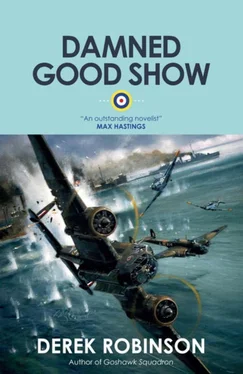Aunts, older cousins, grandparents all took their turns at raising him, shunting him around England like a small, scruffy, wrongly addressed parcel with too much unpaid postage. He was a foul-tempered little brat. Why not? Wherever he went, nobody wanted him and nobody loved him.
But there was enough money in his mother’s will to send him to boarding school, and that was a great relief to everyone.
He went to Wellington. It was a muscular school where they prepared boys for the Army, and Pug found plenty of fights without looking for them. Being small, he usually lost. After a year or so he calmed down. Sheer physical strength, he realized, proved nothing. The way to dominate was through success. He worked hard and put his rivals in their stupid place. He didn’t have a great brain but he got the most out of it. His short body expanded through ruthless exercise; when he was fifteen his chest was so wide that his shirt-sleeves reached his knuckles. Then, abruptly, the money came to an end and with it, school.
He was standing on a railway platform, waiting for a slow train to a dull job with a reluctant uncle, when he saw a poster advertising the RAF School of Apprentices at Halton.
Duff found a home in the Royal Air Force. For the first time he knew the solid reassurance of total security. He stopped worrying about his career, clothes, food, health, pay, religion, sport. Halton organized all that. In return it demanded that Duff learn what made airplanes fly.
“Forget your air commodores,” a sergeant instructor said to Duff’s class of apprentices. “Forget your group captains, your wing commanders, your squadron leaders.” No light shone in their eyes. They had been in uniform only a few weeks, and anyone with rings around his sleeves was god. “Forget your drill corporals,” he said. That was different. Drill bloody corporals had been marching them up and down and across and around the parade bloody ground, cursing them, hating them, drilling all the individuality out of them. Forget drill corporals? The apprentices cheered up. “And for why?” the instructor said. “Because none of them can do what this little beauty can do.” He was standing beside an aero engine, a Rolls-Royce Kestrel, cut away to expose its workings. “Nobody, from drill corporal to air marshal, can get an airplane off the ground. Only an engine can make it fly.” He turned the propeller and they watched the slow march of the pistons. “Suck-squash-bang-shove. Make that happen a thousand times a minute, and your airplane will climb to ten thousand feet while the drill corporal’s still polishing his buttons. What is the purpose of the Royal Air Force?” he shouted. “Why does it exist?”
“To fly airplanes,” they chanted.
“Never forget it! If you’re not helping get an airplane off the ground, you’re not earning your pay. The Royal Air Force exists to fly. No other reason.”
Pug Duff did well at Halton. Later, he applied for pilot training and did well at that, too. Eventually he got his commission. The public-school background helped: the RAF liked a chap who knew how to speak and which knife and fork to use. He had strong arms and legs. The RAF made him a bomber pilot. By the time he reached 409 at RAF Kindrick he was already a flying officer: one rank ahead of Silk and Langham.
They found Pug Duff eating peanuts in the Mess anteroom.
“There must be some mistake. You can’t have been posted here, Pug,” Silk said. “409 is a top squadron.”
“Clerical error, I expect,” Langham said.
“Silko owes me ten bob from two years ago,” Duff said, “and I got tired of waiting. Also, Air Ministry wants to improve the standard of flying on this squadron.”
“Oh dear.” Langham signaled for drinks. “Poor Pug has lost his mind. How sad.”
“Look under the bed,” Silk suggested. “Offer a reward.”
“Talking of losing things,” Duff said. “I hear you two were out for hours and hours last night but you still couldn’t find Germany. Or was it Europe?”
“No, it was Germany we couldn’t find,” Langham said. “We probably shan’t find Norway tonight, and tomorrow night we’re not going to find Luxembourg. Or is it Spain?”
“I think it’s Ireland,” Silk said. “But it doesn’t matter.”
“Good God,” Duff said. “You’re a pretty useless lot, aren’t you?”
“We share the work. I’m pretty, and Tony’s useless.”
That ended the usual courtesies. They moved on to the eternal topics of pilots: the peculiarities of aircraft and aerodromes, the styles of leadership of COs and station commanders, the ups and downs of men they had trained with. Eventually Duff went away to freshen up before lunch.
“Pug looks awfully keen, doesn’t he?” Langham said.
“To tell the truth, I could scarcely see him,” Silk said. “I think he must have shrunk in the wash.”
5
This was the second day of the war. The storms had cleared the North Sea and moved on to soak Scandinavia. The same Blenheim crew that had spotted a battlefleet near Wilhelmshaven was sent on another reconnaissance and, amazingly, found yet more German warships, this time at anchor in Wilhelmshaven harbor. Once again, Bomber Command went into action. 409 Squadron was not required to take part.
The attack was made in daylight. It was briefly reported by the BBC.
A couple of days later, Pixie Hunt heard all about it from a visiting wing commander called Faraday, an old pal, now on the staff at Group HQ.
“Command sent fourteen Wellingtons and fifteen Blenheims,” Faraday said. “Quite a strong force.”
“Twenty-nine bombers should make a mess of something,” Hunt said.
“The Wellington packs a punch. The Blenheim’s too lightweight for this sort of job. Anyway, five Blenheims cocked up their navigation and never found the target. Low cloud.”
“Still leaves ten Blenheims.”
“True. Those ten actually found a couple of battleships and a cruiser. Cloud was so low they had to attack from five hundred feet. No good. Bombs bounced off the decks like ping-pong balls. Meanwhile, heavy flak. Very heavy flak. Flak knocked down five Blenheims.”
“Five out of ten,” Hunt said. “I see. And the Wellingtons?”
“Most never saw a damn thing and came home. But six Wimpys plowed on, found a battleship at Brunsbüttel, bombed it, missed it. Two kites didn’t return.”
“So we sent twenty-nine and lost… seven?”
“That’s one way of looking at it. Another way is to calculate our losses as a proportion of aircraft that actually attacked.” Faraday got a pencil and did the arithmetic. “Seven out of sixteen is 43.7 percent.”
Hunt could only stare.
“Don’t expect to read about it in the papers,” Faraday said. “And don’t be surprised if operations are a bit quiet for a while. If my guess is right, Command is having a good think.”
“Yes. Very likely.”
Faraday got up to leave. “Oh! I nearly forgot,” he said. “The Danish government has complained that a Wellington bombed the town of Esbjerg. Killed two civilians. Esbjerg is one hundred and ten miles north of Brunsbüttel.”
“Poor show.”
“Quite. And the next bomber to stray over Denmark can expect several large Danish shells up its ass.”
THE FIRST WHIFF OF GUNSHOT
1
Faraday was right: Bomber Command had a good think about North Sea operations and losses, and whether one was worth the other.
Meanwhile 409 Squadron did nothing but train, and fly the occasional shipping-search patrol. The only ships they met were British destroyers, which fired at them. Apart from that, the crews saw no action. They soon grew bored. When war was declared everyone had been tense, eager, nervous, expecting massive air attacks and quick retaliation. All this hanging around made a mockery of courage, skill, the aggressive spirit. In mid-September, when Poland was obviously finished, Hitler agreed to the Roosevelt Rules. So now nobody was going to bomb anybody’s mainland. The war was a flop.
Читать дальше












